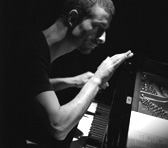28 February 2008
Why Play the Classics?
Interview with Mark Knoop
 Image: Mark Knoop
Image: Mark Knoop © Yatzek
Mark Knoop is one of Australia’s leading performers of recent music and has consistently performed key works by established composers alongside younger artists, to explore the connections between composers of different generations. He recently recorded the complete piano music of David Lumsdaine, which will be released in early 2008 on Tall Poppies. This interview explores briefly some of the aspects of new music with which he is most engaged.
Michael Hooper: When Libra Ensemble was first founded, was it an original aim to 'reach back' in exploration of twentieth-century compositional traditions?
Mark Knoop: Libra Ensemble was founded in 1991 when a group of VCA students came together to perform Roberto Gerhard's work Libra. I did not join the ensemble until 1993 (and became an Artistic Director in 1996), so I can't really comment on the ‘original aims’ of the group. Certainly from 1997 onwards we began to place a greater emphasis on contextualising the contemporary works we were performing by presenting pieces from earlier in the twentieth century.
Our programs were designed to locate these new pieces in both time and space.MH: Was it a priority to perform Australian music alongside classics by the likes of Karlheinz Stockhausen, Mauricio Kagel, Alban Berg and Peter Maxwell Davies?
MK: Yes, absolutely. But not just Australian music. Libra also aimed to perform contemporary international works – Richard Barrett, Horatiu Radulescu, Helmut Lachenmann, Brian Ferneyhough, James Dillon.
MH: Compositions like Toru Takemitsu's Folios or Maxwell Davies's Ave Maris Stella or Berg's Kammerkonzert are generally considered classic pieces. Did Libra see Australian works such as Richard Meale's Coruscations or Keith Humble's Arcade in a similar light?
MK: Just as the more recent international works that Libra brought to Australia was greatly influenced by their precedents, the Australian composers who we were working with and commissioning owed much to composers such as Richard Meale, Keith Humble, Martin Wesley-Smith and others. Our programs were designed to locate these new pieces in both time and space.
MH: As a pianist, did your training include Australian music from this era?
MK: My first piano teacher was Eric Mitchell, with whom I studied until I was 16. His approach, although very much grounded in classical repertoire, included a lot of twentieth century music, as well as some of his own pedagogical compositions. However, I wasn't really aware of Australian music (from any era) until I began studying at the Tasmanian Conservatorium. There, Don Kay and performing staff such as Christian Wojtowicz provoked more of an interest in new music and led to my learning of music by Peter Sculthorpe and Don Banks. But my real interest in Australian 'modernism' only really came after working with contemporary composers and a desire to discover the basis for their music.
About Mark Knoop
Mark Knoop studied piano with Stephen McIntyre at the Victorian College of the Arts and in Europe with various mentors including Herbert Henck, James Avery and Peter Feuchtwanger.
Mark has worked with many respected composers including Michael Finnissy, Chris Dench, James Dillon, Liza Lim, Adam Yee, Benjamin Marks, Richard Barrett, David Young, Matthew Shlomowitz, Thomas Meadowcroft, Erik Ulman, and many others. Solo works composed for him include Chris Dench's into the wormworks and the heart's algorithms, Benjamin Marks's La Chûte, and Dominik Karski's Streams Within for piano and ensemble. Current commissions include a new solo work by Michael Finnissy and Flechtwerk by Richard Barrett for clarinet and piano.
Now based in London, Mark performs regularly in a duo with cellist Christina Waldock as well as other chamber music ensembles and as a soloist. He recently recorded the complete solo piano music of David Lumsdaine for the Tall Poppies label, which will be released early in 2008.
Further Links
Mark Knoop (www.markknoop.com)
© Australian Music Centre (2008) — Permission must be obtained from the AMC if you wish to reproduce this article either online or in print.
Comments
Be the first to share add your thoughts and opinions in response to this article.
You must login to post a comment.